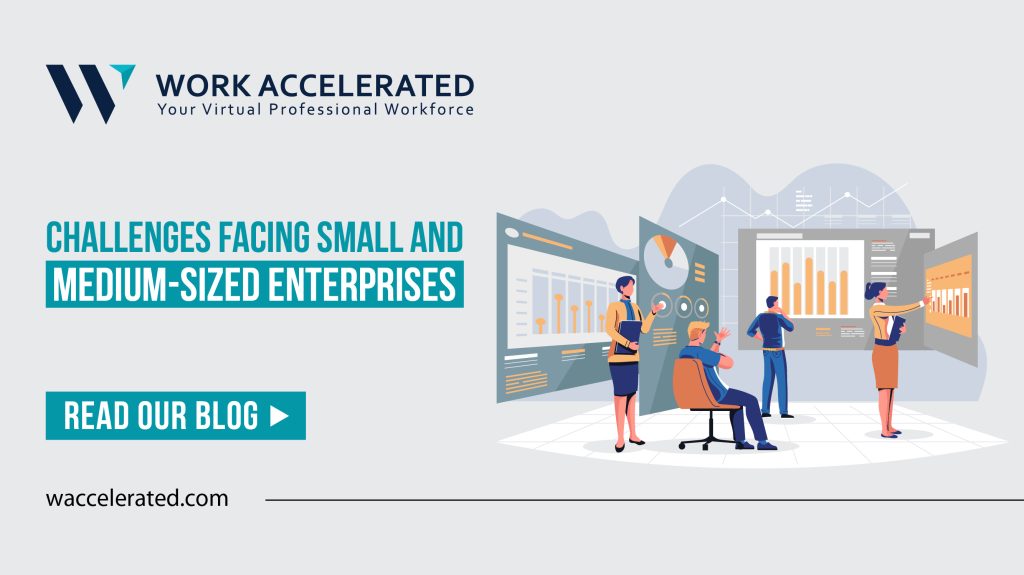Challenges Facing Small and Medium-Sized Enterprises
SMEs or Small-Mid sized enterprises are usually prone to many risks including:
- Cost management challenges,
- Low product demands, and
- Struggling against prolific industry relevant enterprises.
Due to the surging inflation and customers unwilling to take a risk and trying out the services of new or mid-sized firms, SMEs can find it hard to gain a competitive foothold in the industry. To avoid setbacks, SME owners should ensure that they have comprehensive knowledge about their business niche and try to stay updated with their industry trends. Doing this will not only attract customers but by staying updated with industry trends, SME owners can have an idea about the customer’s requirements. It can also help you partner or collaborate with other firms that might offer the same products and services.
Rising Costs Amid Surging Inflation
Since Covid there has been a wave of recession in the US that has caused rising demand and supply costs. Taming the rising operational costs for SMEs owners can prove to be a challenge in the present day. To ensure a smooth workflow and avoid setbacks, SME owners should plan ahead for the financial and inflation challenges that their business might face and also minimize operational costs where the can. Consulting a financial expert to evaluate your company’s finances can help you in cutting costs where necessary without losing out on the company’s valuable resources.
Low Product Demand:
Understanding the customer’s requirement should be the foremost step that SME owners should take before launching a product. Launching a product that has low demand in the market can lead to financial setbacks and might halt growth. Thus, SME owners should conduct comprehensive market research to tailor their products and services to meet current consumer needs.
Managing Your Own Finance
Most SME owners choose to do their business accounting themselves. However, doing this can make it hard for them to focus on other business development tasks due to which they might not only miss out on opportunities but also not have the time to solve executive level challenges that their business might be facing.
Managing your own finances can also lead to inaccurate, outdated or unorganized financial records since most SME owners might not be professional accountants. For accurate and updated financial records without compromising on the company’s payroll, SME owners can hire outsourcing firms like WA who can provide SMEs with professional accountants and expert advice at a fraction of US costs.
Limited Financial Resources
SMEs often struggle with limited access to capital and financial resources, making it challenging to invest in growth, innovation, and day-to-day operations. To avoid this, SME owners should implement strict financial management practices to optimize cash flow, reduce operational costs, and ensure efficient use of available funds. SME owners can also explore other funding options like grants, angel investors, venture capital, crowdfunding, peer-to-peer lending, or microfinance to raise capital if they are struggling with limited financial resources. Another way is to collaborate with larger firms, suppliers, or complementary companies to share resources, knowledge, or distribution networks, helping reduce costs and expand market reach.
Outdated Technology
When you are managing many business operations by yourself, you might fall behind the upcoming technology and software with which you can better manage and perform your tasks. This can also mean that your SME firm might not progress with the same pace as an SME, that is staying up to date with technology, is progressing. To stay updated with industry trends, it is recommended that SME owners hire industry relevant experts or outsource these resources to gain a competitive foothold in the industry.
Increasing Payroll Costs
Amid the surging inflation, hiring and training costs are touching the roof. Employee utility and medical bills might also be getting challenging for some SMEs. To save on training and hiring costs, SMEs can rely on outsourcing firms to get the required expertise without having to spend any time or money on training and hiring a full-time employee.
Attracting New Customers
As an SME owner it can be challenging to get your firm’s word across the market because of the high competition. Consider starting in a niche that has low competition and higher demands. A good start can be setting up your company’s profile on all social media websites to increase your credibility and staying updated with industry trends.
Why Outsource my Operational Tasks?

Some SME owners might be good at doing their own operational tasks, but getting expert advice from industry experts such as financial advice from a CFO can help you perform these operational tasks more efficiently and accurately.
Outsourcing your operational tasks can also help minimize payroll costs as it relatively can cost less than hiring an in-house employee by cutting hiring and training costs, and utility bills.
Further, outsourcing your operational tasks can help you stay updated with industry trends and if there is a setback then you have experienced and professional industry experts to rely upon who can help you navigate through the challenges your SME might be facing.
Work Accelerated: Your Gateway to Highly-Skilled Bookkeepers
SME owners can rely on Work Accelerated to significantly cut down operational costs and hire highly-skilled industry experts. This can help them focus on business development and strategic planning for their company’s growth.
Amid the surging inflation, Work Accelerated is your partner in outsourcing your resources from accountants to CFOs.
WA is dedicated to providing SME owners in the US the opportunity to gain access to highly skilled outsourced resources all at a fraction of the US costs. In turn, business owners can focus on key areas that can help their company gain a competitive foothold in the corporate world.

